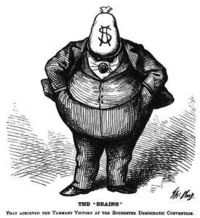Think of this as Volume 15, Number 16 of A-Clue.com, the online newsletter I've written since 1997. Enjoy.
 Every generation's political thesis follows a pattern.
Every generation's political thesis follows a pattern.
First, the old assumptions reach their sell-by date. They are overthrown, usually by someone associated with the old antithesis. But in leaning into the old assumptions as though they were still valid, the crisis leader angers core supporters. And it's only then, when supporters of the new Thesis react, that political change is truly established.
Think about it. Civil War. Lincoln was a former Whig, seen as squishy by Radical Republicans, and after his death those followers “waved the bloody shirt” for a generation to keep Democrats out of power.
The new antithesis, under Grover Cleveland, united Mugwump Republicans with urban and rural Democrats, but through the Populist Uprising it crashed. The new Thesis, under Teddy Roosevelt, prevailed for most of a generation, surrendering only to a new antithesis under Wilson, which accepted Roosevelt's assumptions on economic and foreign policy while adopting outright racism and religious know-nothingism to please its Populist base.
FDR had been part of the Wilson Administration. He supported the idea of budgetary balance at first, and built a lasting coalition only after his supporters rejected Wall Street Republicanism utterly, embracing Keynsian economics and an aggressive foreign policy. Nixon leaned against this as Eisenhower's Vice President, and after his election launched verbal attacks on members of the old coalition, leading his own followers to believe all Democrats were illegitimate, somehow foreign, hippie-type individuals out to take our guns, raid our cashboxes and surrender to the enemy of the moment.
Which brings us here. Obama overthrew the Nixon Coalition, which under GW Bush had reached its sell-by date with Iraq, Katrina and the Big Shitpile.
But there was an important element missing in the President's 2008 victory. Intolerance. By that I mean, most Democrats did not see Republicans as illegitimate, as dangerous, as worthy of loathing. Only Bush. Many were unwilling to defend their own ideas in 2010, which unleashed The Crazy.

Because The Crazy rejects all these things, it is making itself obnoxious now that it has retaken power. From Rick Scott drug-testing all employees through a company run by his wife, to Scott Walker taking rights away from workers, to Rick Snyder removing home rule from cities and counties, to South Dakota and other states seeking to remove rights from women, and Congressional Republicans threatening to kill the whole government over things like contraception and NPR, all these actions are generating an equal and opposite reaction.
The problem for Democrats is the same today as it was for Republicans in 1971. They lack the institutional infrastructure to take full advantage of the other side's weakness. Nixon tried to solve that with his Committee To Re-Elect the President (CREEP), which by 1971 was issuing its own weekly glossy, called Monday, and a monthly called First Monday, both filled with talking points. Trouble was (beyond Watergate) that CREEP didn't support any policy, or cause, only the President.
Notice the comparison? Exactly. The current President's online infrastructure only supports the President. It isn't supportive of down-ballot candidates. It has no life beyond this Administration, and no interests save this Administration's causes.

And so Democrats feel behind the eight ball, unless there is a crisis to motivate them. This The Crazy has been happy to supply.
Regular, institutional Republicans have a Clue about all this. They're not stupid. (Unlike The Crazy.) But they don't have control of their own boat, the inmates have taken over their asylum. They're going over the falls and there's nothing they can do about it.
But there's another element to this story. It's partly about money, and partly about me.

These people represent a clear and present danger to our democracy. The meta-cause of our time, the one that rides on top of every other cause, is the one that (yes) Al Franken has identified in his Senate work – the idea that money trumps humanity in our political debate, that the more money you have the more control you should have over the government, and everyone else under that government.
Many of our great debates, throughout our history, were ultimately about this. The battle between Adams and Jefferson, the fight over the US Bank, the Progressive rejection of the Trusts, and FDR's call welcoming the hatred of the rich, all these are battles in that larger, meta-war.
Which must be engaged in again.
Until we have true campaign finance reform, in whatever form that must take to pass Constitutional muster, we're in trouble as a democracy. Thank God the Internet still allows us to get around the Money Power. It's going to be a long fight, one that will only be won after the Money Power is defeated in repeated elections and the Obama Thesis is fully validated.
Part of that battle requires some intolerance. An important element of every new Thesis in our politics is to reject The Crazy, and all those who engage in it. We must become intolerant of craziness, in our political life, and personally. Reject those who practice it, turn away from them, ignore them so aggressively that they learn they're beyond the pale.

So I'm doing my bit. I'm rejecting The Crazy on this blog. People like Peng, cyberbullies who engage here with nothing but personal invective, are no longer welcome. This is my house. If you wish to be here, I demand a minimum of tolerance in the comments.
As do scaled sites.
It's sad that a little intolerance is necessary for a consensus to proceed. But some people deliberately place themselves outside that consensus, and exhibit complete intolerance for all those within it. In fact, many crazies think they are the consensus, the new majorities an aberration. It's a Mad Hatter Tea Party. Many Democrats felt that way in the 1970s, and Watergate, along with Carter's surprise election, let them continue in that delusion for an extra decade.
But it was, in the end, a delusion. It's morning in America again, folks. Barack Obama's morning. Those who reject him absolutely – the birthers and the tenthers and the rest of the Crazy – they will need to be exiled from the mainstream of our political life.
And personally I won't have a thing more to do with them. I'm not arguing with them. I'm doing something more powerful. I'm not listening to them anymore. I reject them out of hand as non-serious, their words as hate speech, which is what it is.
You should do the same.










Thanks, Dana. a lot of good points. I’ve been gaining on your meme for 18 months.
Lincoln’s bloody shirt explained the Lyric from Alabama’s Song of the South, Daddy was a veteran, a southern democrat. They oughta get a rich man to vote like that.
Thanks, Dana. a lot of good points. I’ve been gaining on your meme for 18 months.
Lincoln’s bloody shirt explained the Lyric from Alabama’s Song of the South, Daddy was a veteran, a southern democrat. They oughta get a rich man to vote like that.
Dana – here’s a virtual quarter to throw under Peng’s bridge as you explain – again – you won’t be using it any more.
History will call this the Troll Age, I swear.
Pat, four-generations-back Democrat of the old FDR consensus, alas.
Dana – here’s a virtual quarter to throw under Peng’s bridge as you explain – again – you won’t be using it any more.
History will call this the Troll Age, I swear.
Pat, four-generations-back Democrat of the old FDR consensus, alas.
First of two posts: [the daily irrelevant]
Hi, Dana, I’m curious: what do you know about this Peng chick who “comments” here? She strikes me as a freakily focused avatar of Sarah-Michele, our photogenic harridans of hate. Maybe Peng is a nom-de-web of Rebecca Mansour!
First of two posts: [the daily irrelevant]
Hi, Dana, I’m curious: what do you know about this Peng chick who “comments” here? She strikes me as a freakily focused avatar of Sarah-Michele, our photogenic harridans of hate. Maybe Peng is a nom-de-web of Rebecca Mansour!
Second:
“Democrats … lack the institutional infrastructure to take full advantage of the other side’s weakness. The current President’s online infrastructure only supports the President. It isn’t supportive of down-ballot candidates. It has no life beyond this Administration, and no interests save this Administration’s causes.”
Astute observations, Dana, but from my urban north perspective, the sheer staying power of “this administration” is crucial. The hope and change Barack Obama represented in 2008 wasn’t all about issues and won’t be in 2012.
As long as our current courts are going to privilege money and money’s access to airwaves over citizens, the left-leaning net roots need to develop our own infrastructure to elect center-left and technically sophisticated Congressional and state majorities.
Those elected should understand the need for long-term fiscal security, not “kicking the can down the road.”
Second:
“Democrats … lack the institutional infrastructure to take full advantage of the other side’s weakness. The current President’s online infrastructure only supports the President. It isn’t supportive of down-ballot candidates. It has no life beyond this Administration, and no interests save this Administration’s causes.”
Astute observations, Dana, but from my urban north perspective, the sheer staying power of “this administration” is crucial. The hope and change Barack Obama represented in 2008 wasn’t all about issues and won’t be in 2012.
As long as our current courts are going to privilege money and money’s access to airwaves over citizens, the left-leaning net roots need to develop our own infrastructure to elect center-left and technically sophisticated Congressional and state majorities.
Those elected should understand the need for long-term fiscal security, not “kicking the can down the road.”
I don’t know who or what Peng is, although I suspect it’s a middle-aged man who was building in-fill homes around Decatur, a controversy I covered for Voic.us, a southern politics site, some years ago. (It resulted in what I called a 35-40 or fight law — new single-family homes can’t be more than 35 feet tall and must leave 40% of the land permeable so water can flow.)
Doesn’t matter. The question is whether such trolling is useful. It may be, on a large scaled site where both sides get equal time.
But this site is my house. You don’t come into my house, call me names, trash the place, run out the front door and expect me to like it. That’s bullying, cyber-bullying. It’s like the mother who attacked her little girl’s friend on Facebook. It does damage. It’s meant to.
I have been doing work online for 25 years, and covered the concept of netiquette from its beginning. Trolls are to netiquette what terrorists are to the rest of society. Regardless of their cause, they are destructive.
And just as we no longer tolerate terrorists in our midst, so I have decided I will no longer tolerate trolls in my house. Go somewhere else. It’s a big Internet. If you’re upset about this stance, then maybe I really am doing something useful.
I don’t know who or what Peng is, although I suspect it’s a middle-aged man who was building in-fill homes around Decatur, a controversy I covered for Voic.us, a southern politics site, some years ago. (It resulted in what I called a 35-40 or fight law — new single-family homes can’t be more than 35 feet tall and must leave 40% of the land permeable so water can flow.)
Doesn’t matter. The question is whether such trolling is useful. It may be, on a large scaled site where both sides get equal time.
But this site is my house. You don’t come into my house, call me names, trash the place, run out the front door and expect me to like it. That’s bullying, cyber-bullying. It’s like the mother who attacked her little girl’s friend on Facebook. It does damage. It’s meant to.
I have been doing work online for 25 years, and covered the concept of netiquette from its beginning. Trolls are to netiquette what terrorists are to the rest of society. Regardless of their cause, they are destructive.
And just as we no longer tolerate terrorists in our midst, so I have decided I will no longer tolerate trolls in my house. Go somewhere else. It’s a big Internet. If you’re upset about this stance, then maybe I really am doing something useful.